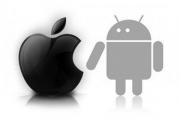|
|
|
|

|
Android, iOS Share 92 Percent of Smartphone Market
Published May 20, 2013
|
Android and iOS, the top two ranked smartphone operating systems worldwide, accounted for a combined 92.3% of all smartphone shipments in the first quarter of 2013, according to the International Data Corporation (IDC).
IDC's Worldwide Quarterly Mobile Phone Tracker report also showed that Windows Phone overtook BlackBerry to claim third place.
Android smartphone vendors and Apple shipped a total of 199.5m units worldwide during the quarter, up 59.1% from the 125.4m units shipped during the same period in 2012.
"Underpinning the worldwide smartphone market is the constantly shifting operating system landscape," noted Ramon Llamas, research manager with IDC's Mobile Phone team. "Android and iOS accounted for more than the lion's share of smartphones in the first quarter, but a closer examination of the other platforms reveals turnaround and demand for alternatives. Windows Phone has benefited from Nokia's participation, and BlackBerry's new BB10 devices have already hit am units shipped in its first quarter of availability."
"Windows Phone claiming the third spot is a first and helps validate the direction taken by Microsoft and key partner Nokia," said Kevin Restivo, senior research analyst with IDC's Worldwide Quarterly Mobile Phone Tracker.
"Given the relatively low volume generated, the Windows Phone camp will need to show further gains to solidify its status as an alterative to Android or iOS."
Android remains the leader in the smartphone OS market, increasing its market share despite the seasonality working against the entire smartphone market in the first quarter. Samsung was once again the clear leader among all Android smartphone vendors, commanding 41.1% market share. Following Samsung was a long list of vendors with single-digit market share, and an even longer list of vendors with market share less than 1%. The intra-Android competition has not stifled companies from keeping Android as the cornerstone of their respective smartphone strategies, but has upped the ante to innovate proprietary experiences.
Apple iOS marked its largest ever first-quarter volume on the strength of its iPhone shipment volumes, yet the platform posted a year-on-year decline in market share and lower year-on-year shipment growth than the overall market. Although demand remains strong worldwide, the iOS experience has remained largely the same since the first iPhone debuted in 2007. That appears ready to change as online rumors and speculation predict a massive overhaul of the user interface when iOS 7 debuts.
Windows Phone posted the largest year-on-year gain among the leading operating systems, more than doubling its size from a year ago. Nokia was largely responsible for driving these volumes higher, accounting for 79% of all Windows Phone shipments during the quarter. Since Nokia began shipping Windows Phone devices, the company has shipped a total of 20.3m units and grown the footprint worldwide to include multiple market segments. Meanwhile, other vendors continue to offer Windows Phone devices, but mainly as an alternative to their signature Android devices. Still, the gains made by Windows Phone demonstrate both end-user demand and OEM support.
BlackBerry realised double-digit declines from a year ago, but this masks the progress that the company has made since then. In its first quarter of availability, BlackBerry formally introduced and shipped more than 1m units running on its new BB10 platform, a significant breakthrough for the company. At the same time, BlackBerry still relied on its BB7 smartphones for the majority of its shipment volume, which, due to their lower prices, were well received within key markets.
Linux saw continued decline in shipment volumes to start off the year, reaching levels not seen since 1Q10. The lower volumes were not completely unexpected, as most vendors have switched to Android and Samsung (Linux's biggest OEM supporter) readies the debut of its first Tizen-powered smartphones for later this year. This is shaping up to be a pivotal year for the open-source operating system, as multiple platforms, including Mozilla, SailFish, Tizen, and Ubuntu are expected to introduce or launch their first smartphones in the coming months.
Symbian recorded the largest year-on-year decline compared to any other operating system. The decline for Symbian-powered smartphones was expected as its primary OEM supporter Nokia has transitioned to Windows Phone and Japanese vendors have moved to Android. Although shipments continue to decline, IDC believes that Symbian shipments could continue into 2014, but in drastically lower volumes.
Posted by
VMD - [Virtual Marketing Department]
|
|
|

